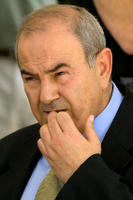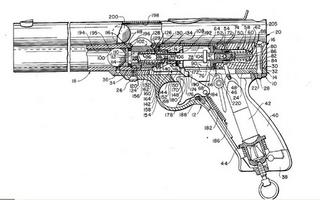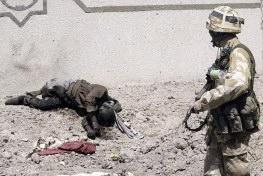15 April 2005
The first high-level contact between Washington and the fledgling Iraqi transitional government came Monday, with an emergency flight to Baghdad by US Defense Secretary Donald Rumsfeld.

Over the past few weeks, Washington’s official pronouncements and reports in the US media have been filled with rhetoric about the new Iraqi regime representing an historic transition from dictatorship to democracy. There has, predictably, been no attempt to square this official line with Rumsfeld’s mission to Baghdad, whose purpose is to force the incoming Iraqi administration to leave in place ex-military and police officers from the Saddam Hussein dictatorship who have been recruited by the CIA and Pentagon for the new US-organized Iraqi security forces.
Speaking to reporters en route to his surprise meeting with the Iraqi officials, Rumsfeld indirectly hinted at the nature of his visit, declaring, “It’s important that the new government be attentive to the competence of the people in the ministries and that they avoid unnecessary turbulence.”

He reportedly said he intended to warn the Iraqis against “corruption” and “cronyism.” These words must have evoked guffaws in many quarters, given Rumsfeld’s oversight of multi-billion-dollar contracts to Halliburton and its subsidiary KBR for a reconstruction effort that has provided a huge windfall for the firm previously headed by Vice President Dick Cheney.
Reporting on the talks between the Pentagon chief and newly installed Iraqi Prime Minister Ibrahim Jaafari, Reuters news agency stated, “Rumsfeld expressed particular concern about any clear-out of Iraq’s defense and interior ministries, which are at the heart of efforts to put Iraq’s security forces in charge of battling the country’s Sunni Muslim-led insurgency.”
The main impulse for Rumsfeld’s trip was growing sentiment within the Shiite Islamist parties, which were the primary victors in last January’s election, for a purge of former Baathist military and secret police officers enlisted by Washington in its efforts to suppress resistance to the US occupation.
“Our concerns are to maintain momentum, and that there be no major tinkering with security forces,” a US official in Baghdad told the Financial Times of London. “If you get rid of anyone who ever carried a Baathist card, then you get rid of everyone with experience and training, including some that have proven themselves in the last nine months.”
Rumsfeld’s intervention reveals in a nutshell the utter hypocrisy of Washington’s democratic pretensions. It points to the real aims and methods of the US occupation of Iraq, and the real nature of the relationship between the “sovereign” transitional government and its American overseers.

Rumsfeld’s visit follows by only days the largest demonstrations in Iraqi history, which brought hundreds of thousands of people—predominantly Shia, but also Sunni—into the streets of Baghdad demanding an end to the US occupation and equating George W. Bush and Saddam Hussein.
The demonstration, part of a continuing political campaign mounted by the radical Shia cleric Moqtada al Sadr, has placed significant political pressure on Jaafari, whose Dawa Party seeks to appeal to the same Shia population. At the same time, his key government partner, former Kurdish guerrilla leader and incoming Iraqi president Jalal Talabani, has insisted he does not want the US troops to leave.
For the civilian chief of the US military to fly to Baghdad to issue orders to the new government is a clear signal in itself. Washington views the new transitional regime as little more than a public front for what is, in fact, a transition to a new phase in the occupation. The Pentagon envisions a gradual reduction in US troop levels until American forces are able to withdraw to fortified bases and allow Iraqi puppet forces to carry out day-to-day repression.
Key to this strategy is the use of the ex-members of Saddam Hussein’s repressive apparatus, whose “experience and training” are precisely in the suppression of the same Shia masses who have turned out in such great numbers to demand an end to the US occupation.
In the early days of the US occupation, the head of the American operation, L. Paul Bremer, instituted a sweeping “de-Baathification” program and disbanded the Iraqi army—a move subsequently seen as a major blunder by many in the US security establishment. Within months of the US invasion, however, the CIA began quietly recruiting former officers of Saddam Hussein’s hated Mukhabarat secret police.
In 1991, in the wake of Iraq’s defeat in the first Gulf war, it was the Mukhabarat that organized the suppression of a Shia uprising in the south of Iraq. The bloody crackdown was conducted with the tacit backing of Washington, which allowed the Iraqi military to utilize its combat aircraft to attack the rebels.
 After the dissolution of Bremer’s occupation authority and the installation of long-time CIA asset Iyad Allawi as the prime minister in the provisional government, the recruitment of former Hussein regime members was stepped up. Allawi is himself an ex-Baathist, and built his US- and British-backed exile group, the Iraqi National Accord, around disgruntled Baathist officers and intelligence agents.
After the dissolution of Bremer’s occupation authority and the installation of long-time CIA asset Iyad Allawi as the prime minister in the provisional government, the recruitment of former Hussein regime members was stepped up. Allawi is himself an ex-Baathist, and built his US- and British-backed exile group, the Iraqi National Accord, around disgruntled Baathist officers and intelligence agents.It is now reported that up to 70 percent of the officers in the US-organized Iraqi security forces are ex-Baathist officers. An entire commando force of 10,000 members, which is considered the most reliable Iraqi unit, is composed almost entirely of ex-Iraqi military personnel.
Though Washington’s favorite, Allawi’s party received less than 10 percent of the vote in January. The United Iraqi Alliance, the coalition dominated by Shia religious parties, won the election through a campaign that called for an end to the US occupation and a purge of Baathists from the government.
 Since being tapped as prime minister, Jafaari has been forced to back off from the call for a US withdrawal. Now, Rumsfeld has ordered him to shelve plans to root out military and police officers who are associated with massacres, assassinations and torture against the Shia population.
Since being tapped as prime minister, Jafaari has been forced to back off from the call for a US withdrawal. Now, Rumsfeld has ordered him to shelve plans to root out military and police officers who are associated with massacres, assassinations and torture against the Shia population.The Shia parties have charged that many of those involved in such crimes are being brought back to carry out similar atrocities. Hostility to the rehiring of Baathist officers boiled over last month following reports that three members of the Badr Corps, a Shia militia that is affiliated with the United Iraqi Alliance, were tortured to death by members of the security forces.
Washington is determined to utilize the ex-Baathists as the command structure for repressing resistance to its occupation. It fears that if they are purged, the new security force will disintegrate.
There is no prospect for the transitional regime headed by Jafaari securing popular support unless it can present itself as independent of a US occupation that is overwhelmingly opposed by the Iraqi people. Nevertheless, the visit by the US defense secretary has made it clear that Washington has no intention of tolerating any real independence, especially when it comes to the central question of its puppet Iraqi security forces.

In the final analysis, the Rumsfeld trip only underscores the colonial character of the US intervention in Iraq and the untenable nature of Washington’s efforts to forge a viable puppet regime. At the same time, the spectacle of the US strong-arming the new Iraqi government into accepting the return of Saddam Hussein’s military and secret police provides a devastating exposure of the propaganda about US bombs and troops spearheading a wave of democratic change in the Arab world.





